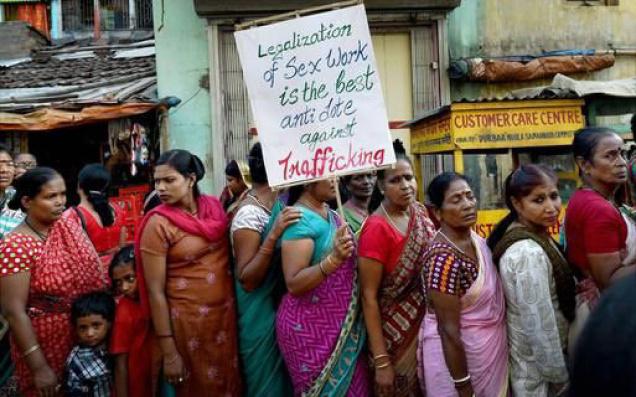The Trafficking of Persons (Prevention, Protection and Rehabilitation) Bill, introduced in 2016 by the Minister for Women and Child Development and approved in February 2018 by Prime Minister Modi and the Union Cabinet, was tabled in Congress with the support of sexual trafficking victims in a public letter addressed to female Members of Parliament on July 11, 2018. Activists from the Lawyers Collective and Amnesty International argue there are many legislations scattered around different Legal Codes that already cover sex trafficking and the 2016 bill does not serve the purpose of unifying the different languages to become a comprehensive act, but rather imposes further penalties that will harm sex workers, trans and gender diverse persons in a disproportionate manner, contradicting international treaties ratifies by India.
CHAPTER XII
OFFENCES AND PENALTIES
Clause 31. (iv) by administering any chemical substance or hormones on a person for the purpose of early sexual maturity; or
[…]Clause 41. (1)Whoever commits trafficking of a person with the aid of media, including, but not limited to print, internet, digital or electronic media, shall be punished with rigorous imprisonment for a term which shall not be less than seven years but may extend to ten years and shall also be liable to fine which shall not be less than one lakh rupees.
(2) Whoever distributes, or sells or stores, in any form in any electronic or printed form showing incidence of sexual exploitation, sexual assault, or rape for the purpose of extortion or for coercion of the victim or his family members, or for unlawful gain shall be punished with rigorous imprisonment for a term which shall not be less than three years but may extend to seven years and shall also be liable to fine which shall not be less than one lakh rupees.
[…]STATEMENT OF OBJECTS AND REASONS
Trafficking in human beings is one of the largest organised crime violating basic human rights. Trafficking in human beings may be for sexual and physical exploitation and also for other forms of exploitation like forced labour, etc. This is primarily fueled by poverty, illiteracy and lack of livelihood options
Other critical analysis
How new anti-trafficking bill introduced in LS will actually harm those it wants to protect – DNA India
Image credit: Delhi Criminal Lawyers

